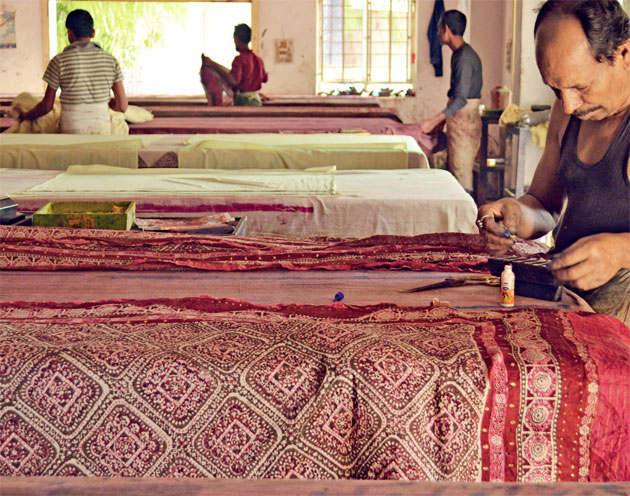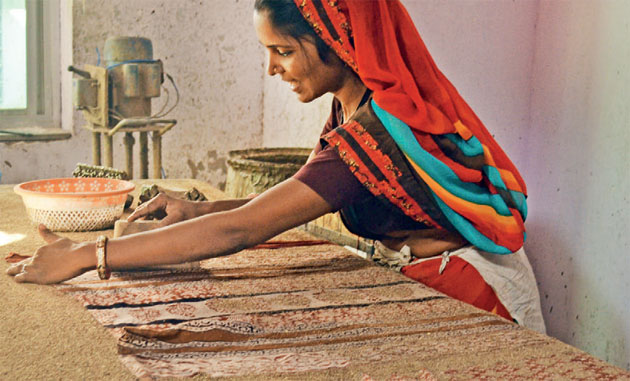 Rinku Dosaya, 35, lives in a double-storey house in the small town of Bagru, about 50 km from Jaipur. A member of the Chhipa community of traditional hand-block printers and handloom dyers in Rajasthan, Dosaya learnt the craft of Dabu printing from his mother Shanti when he was a young boy.
Rinku Dosaya, 35, lives in a double-storey house in the small town of Bagru, about 50 km from Jaipur. A member of the Chhipa community of traditional hand-block printers and handloom dyers in Rajasthan, Dosaya learnt the craft of Dabu printing from his mother Shanti when he was a young boy.
Today, Shanti, who is almost 60, has retired, and her son not only carries on the family’s traditional craft-based business but has also expanded it considerably.“My parents used the blocks to print on fabric themselves and worked on the floor of our then small, single-storey house.
But I have now constructed another floor which is used only for printing and dyeing and got three tables which are used for printing,” says the tech-savvy Dosaya, who is active on social media. He has created a network of women customers, many of whom run small boutiques in different cities of India, from whom he accepts orders for sarees, dupattas and garments directly and recieves payments online.
Dosaya himself dispatches the orders through courier and spends a large part of his day online. For printing and dyeing, he employs others, mostly women from the neighbourhood, who can work flexible hours according to their convenience even as they take care of their children and do household chores.
Vimla and Mali are neighbours who are temporary workers at Dosaya’s set-up. Mali has a 12 year old son who returns from school at lunch time.
Both work for a few hours every day when Dosaya calls them and earn Rs 200 to Rs 500 daily, depending on the hours they put in as well as the work – some orders involve dyeing the fabric in many shades and printing of intricate designs.
“Sometimes when I have a good month, I employ even 10 people daily and make revenues of up to Rs 50,000 a month,” says Dosaya. But now, in the post-festival slack season, sales are low and he doesn’t even make Rs 5,000 a month, he complains.
 While the Chhipas have been printers and dyers for four generations, many of the families who run the printing businesses now employ other local labourers to meet demand. Overall, they estimate, there are about 5,000 people employed in the hand-printing craft in Bagru.
While the Chhipas have been printers and dyers for four generations, many of the families who run the printing businesses now employ other local labourers to meet demand. Overall, they estimate, there are about 5,000 people employed in the hand-printing craft in Bagru.Roshan Chhipa belongs to a family that has been practising Dabu printing for four generations in Bagru. He reckons that the annual turnover of printed fabrics from Bagru is about Rs 100 crore, mostly for the domestic market. The family run company RK Derawala is a large supplier to Fabindia, the largest ethnic products retailer and exporter, and other retail chains and online businesses around the country.
They run a large set-up with over 20 tables and employ up to 20 workers daily.
Now, it’s not just the families with traditional skills – many others belonging to different communities too have been trained in hand-printing. Women, who traditionally did not do hand-block printing, are learning the craft and earning daily wages when they can take time off from housework.
Umarudeen, who moved to Bagru from a village nearby about two decades ago, has been a block printer for 15 years. He earns daily wages and makes Rs 12,000 to Rs 15,000 a month.
“There are people from different communities working as traditional printers and dyers here. Many farmers, too, come to work seasonally. However, young people are not interested and our children don’t want to do this because it’s hard manual work which also requires a lot of skill,” he explains.
Fabindia has been sourcing printed fabrics from the Bagru crafts cluster for over three decades now and has been supporting craft entrepreneurs in the region.
Online ethnic and crafts products platform Jaypore engages with the Bagru printing cluster in a big way, having provided its platform to showcase the work of artisans and craftspeople from the region.“We also procure textiles from them for our own private label lines and in some cases, have made significant investments in design upgrade,” says Shilpa Sharma, cofounder of Jaypore.The idea, she says, is to work closely with the craftspeople, to do a contemporary take on print, which will allow Jaypore to place large orders for the private label. For a single collection of Jaypore, there could be 10-12 Dabu prints ordered across fabrics for apparel, sarees and stoles/dupattas.
The size of a typical order would be 5,000-6,000 metres of fabric and 150-200 sarees.
However, despite sourcing by large online and retail companies, for entrepreneurs and artisans in Bagru, life is not always easy. Even large businesses such as RK Derawala and Lal Chand Derawala have to grapple with infrastructure issues such as water scarcity and being clubbed with other polluting printing units that use chemical dyes.
Besides, the Indian government has still not provided traditional crafts with a ‘handicraft’ mark, which would help them avail of various subsidies and benefits.
There is no shared design bank available for the smaller businesses, which are cash-strapped, and there have been no efforts to develop a brand name for the Dabu prints despite having a geographical indicators tag.
Designers including Jaipur-based Tripti Bhargava are helping develop the Bagru brand name.
“I create my own designs and blocks and work with a captive printer in Bagru for over 20 years now,” says Bhargava, who besides exports and wholesale of home furnishings recently launched her own clothing label Urbania of minimalistic fashion design.
While many of these reasons are leading to apathy among younger members of the Chhipa community who are moving away from the traditional family crafts businesses, there are a few hundred young men and women in Bagru who are running internet-savvy businesses.
Vikas Chhipa’s family is a big supplier to Reliance Retail and other chains. But the 23-year-old works every night after the printing operations in the family business shut down to take orders online and through apps including those for resellers. “Online is a growing business and we often sell over 1,000 sarees a month. Many of our online customers are overseas,” he say.
